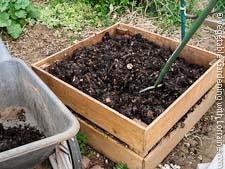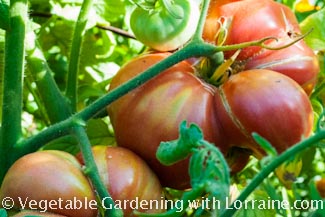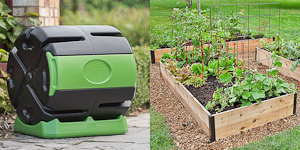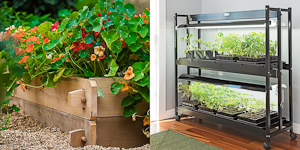- Home
- Vegetable Gardening Tips
Lorraine's Top 12
Vegetable Gardening Tips
Vegetable Gardening Tip #1
Start small.
The first of my vegetable gardening tips is that if you're just starting out, start small and care for a few plants really well. Gardening takes time, and the bigger the garden, the more time. Grow one or two tomato plants, half a dozen lettuces, a small patch of carrots - but keep them weed free, properly staked and harvested, and learn to make a mean batch of compost. This will give you much more satisfaction than a big rototilled area that has more weeds than you can control come August, and which will become a chore. Expand next year.
Vegetable Gardening Tip #2
Start making compost.

Consider compost one of your most important crops. It is the crop that feeds your soil microbes, which in turn feed your plants. Compost eventually turns into humus, which holds mineral nutrition in the soil, which the microbes then serve up to the plants like waiters at a restaurant. (And then the plants tip the waiters with sugars exuded from their roots. Cool, huh?) Composting is not just an alternate way of disposing of kitchen waste, it is really necessary for a successful, healthy garden.
Vegetable Gardening Tip #3
Plant close to the house.
Nothing makes a garden happier than the gardener's shadow. When you plant close to the house, the garden becomes part of the household. You'll find yourself pulling a weed here or there while taking out the trash, notice the tomato leaves starting to curl while you're walking up the driveway, or that your lettuces are wilting as you let the cat out.
I learned this vegetable gardening tip the hard way, having to walk a few hundred yards through a field to tend my first garden, which, like any neglected relationship, withered. Walking right past the garden everyday lets you tend to and correct problems in little doses throughout the week, rather than as a big chore saved up for Saturday. Check in daily - make a relationship with your garden. It will feed you more than food. And if you're gardening at a community garden, make visiting there part of your regular schedule.
Vegetable Gardening Tip #4
Pick a spot that gets at least 8 hours of sun.
Most vegetables require 8 hours of sun per day to grow to maturity and produce well over the course of summer. If you don't have a spot that gets that much sun, there are still a lot of things you can grow, like lettuce, Swiss chard, beans, or broccoli. But ALL vegetables are going to need at least 4 or 5 hours of full sun. If you have only deep shade, try container vegetable gardening with some cherry tomatoes or hot peppers in whatever little sunny spot you do have. For other good shade choices see the layout page
Vegetable Gardening Tip #5
Stay on top of the weeds.

Kind of a "Well, duh", but nip-them-in-the-bud is the rule of thumb here. Weeds won't seem like much of problem at first, and then one day, you'll be walking by your garden and won't be able to see what you planted! Weeds will sneak up on you, and the old saying "One year of weeds, seven years of seeds" is really true. Weeds steal nutrients, light and water from your plants, and no matter what, don't let your weeds go to seed. I have a little Japanese weeding sickle (a "Nejiri Kama") that I keep by the back door, and it's a kind of a meditation for me to go out and hang with my vegetables and weed a little every day. Check out the organic weed control article for more ideas.
Vegetable Gardening Tip #6
Don't confuse compost with fertilizer.
Growing vegetables takes minerals out of the soil, and unlike the olden days, our waste products don't go back into the soil, they go down the into the sewers, the rivers and out to sea. Compost is important to feed the microbes, but you will also need to put minerals back into your soil every year by using a complete organic fertilizer.
Vegetable Gardening Tip #7
Plant what you most like to eat.

It's really fun to look through the seed catalogs at the eggplants that actually look like eggs or the Romanesco broccolis that look like fractal screensavers, but if you're just starting out, grow stuff you know you love to eat. Tomatoes, basil, lettuces, beans and carrots are hard to beat. For you fresh corn-on-the-cob lovers, know that corn needs to be grown in a pretty large patch in order to pollinate well and produce full ears. Save it for your second or third year of gardening.
Vegetable Gardening Tip #8
Try one new thing every year.
After you have chosen your staple crops, try growing one fun thing. If you love it, add it to your repertoire, if you don't, you had fun and learned something. Here you get to experiment with something different from those luscious seed catalogs that land in your mailbox every January (which Tito jokingly refer to as "porn for gardeners"). Try out rainbow carrots, purple potatoes, or those little eggplants that actually look like eggs.
Vegetable Gardening Tip #9
Respect the recommended plant spacings.
Vegetable gardening tips grew out of vegetable gardening errors. It's very easy (even for experienced gardeners!) when transplanting baby tomato plants from the garden center or when sowing broccoli seeds to want to plant them too close together. You have all that bare soil, and they just don't look that big. That darling little tomato may get to be five feet across and six feet high by August, so pay attention in April. Pay attention to correct planting depth, too.
Vegetable Gardening Tip #10
Allow yourself to feel the joy of watching things grow.
No matter how many wrinkles I get, I never tire of watching seeds sprout up out of the ground. That joy fuels the desire to nurture my plants, provide them with everything they need, and consciously participate in the cycle of life. It a Love thing. Let yourself be a kid and feel the wonder.
Vegetable Gardening Tip #11
Enjoy the process.
Slow down. Don't start gardening by being focused on the harvest. Whether you're in school, at work, at the dinner table or in bed, if you're too focused on the end point you'll end up missing a lot. Nurture the garden and become a careful observer of nature in the process. It will nurture you and feed your soul as well as your body.
Vegetable Gardening Tip #12
Read a book about soil.
Soil is not just bits of dead rock. It is an extremely diverse and miraculous living ecosystem upon which all life on planet Earth depends (Well, okay... there are a few ecosystems at the bottom of the ocean that are powered by hydrogen sulfide vents). But how does a voluptuous, bursting-with-flavor, one-pound beefsteak tomato develop from a tiny seed? Water, carbon dioxide, and minerals that are recycled and made plant-ready by the microbes in our living soil, powered by sunlight. What we see above ground is a reflection of what is below ground, and our own health is a reflection of our soil's health. (This vegetable gardening tip is a good one for wintertime, when you're twiddling your thumbs and dreaming in green.) Some good book choices are:
The Soul of Soil by Smilley and Gershuny
The Intelligent Gardener by Steve Solomon
Teaming with Microbes by Jeff Loewenfels
Help share the skills and spread the joy
of organic, nutrient-dense vegetable gardening, and please...
~ Like us on Facebook ~
Thank you... and have fun in your garden!
Affiliate Disclaimer
This website contains affiliate links to a few quality products I can genuinely recommend. I am here to serve you, not to sell you, and I do not write reviews for income or recommend anything I would not use myself. If you make a purchase using an affiliate link here, I may earn a commission but this will not affect your price. My participation in these programs allows me to earn money that helps support this site. If you have comments, questions or concerns about the affiliate or advertising programs, please Contact Me.Contact Us Page
You Are Here: Vegetable Gardening Home > Vegetable Gardening Tips



